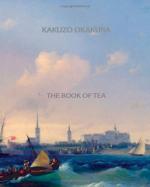|
This section contains 546 words (approx. 2 pages at 400 words per page) |

|
Introduction Summary and Analysis
A historical background is established. The Japanese under Emperor Meiji in the second half of the 19th century were pursuing efforts to modernize. Modernization came with a price, namely, the destruction of the 'old' or traditional way of Japanese living. Students went to European universities, families adopted Western dress and learned to sit in chairs, and some tried to eat beef, although it was forbidden by Buddhism.
However, many did not accept efforts of modernization. There are several rebellions documented from this time period, and many more scholars and others who attempted to preserve the old culture. One of these is the author of the Book of Tea, Kakuzo Okakura.
Okakura was born in 1862 to a silk merchant. He studied at an English-language university, and was fluent in three languages - Chinese, English, and Japanese. He studied under a Harvard-educated American...
(read more from the Introduction Summary)
|
This section contains 546 words (approx. 2 pages at 400 words per page) |

|




